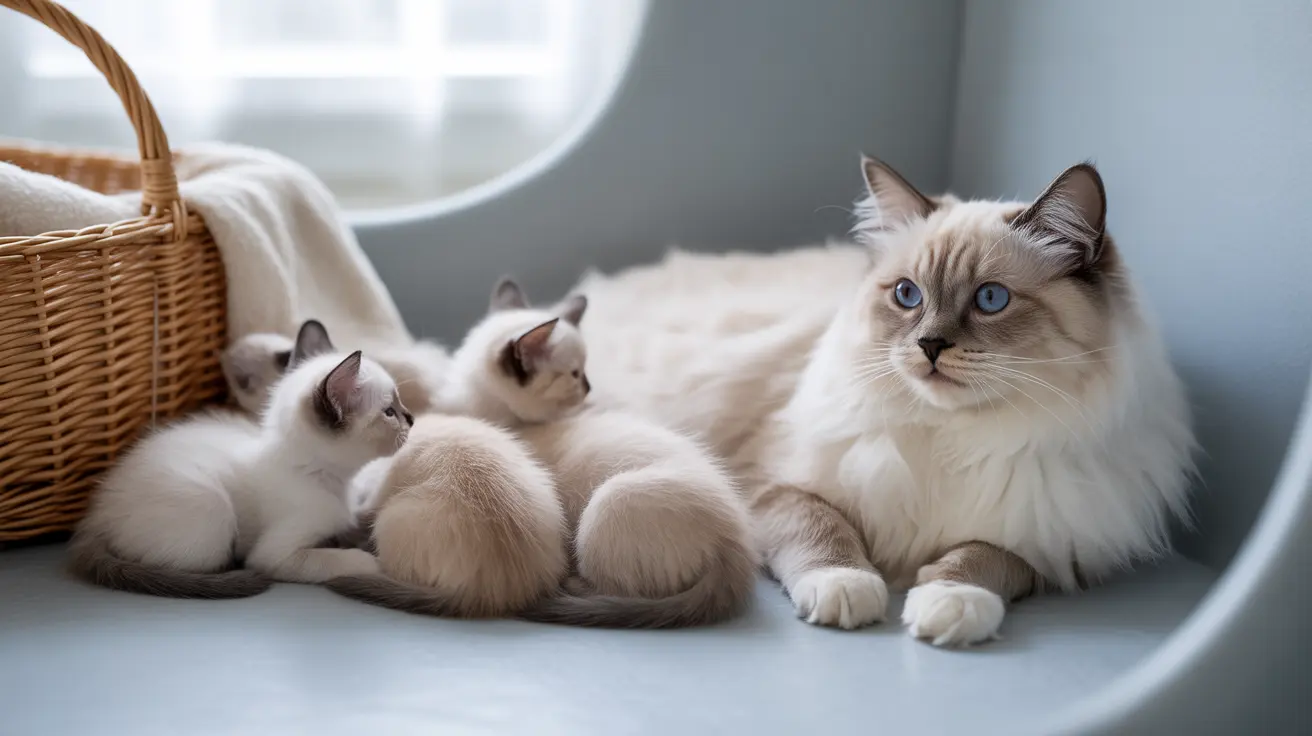When your cat gives birth, understanding what happens during the postpartum period is crucial for ensuring both mother and kittens remain healthy. One common concern among cat owners is postpartum bleeding, also known as lochia. This natural process helps the mother cat's body recover from childbirth, but knowing what's normal and what isn't can make all the difference in your pet's recovery.
In this comprehensive guide, we'll explore everything you need to know about postpartum bleeding in cats, including normal expectations, warning signs, and when to seek veterinary care.
Understanding Normal Postpartum Bleeding
After giving birth, cats typically experience a period of light bleeding that can last anywhere from 2-3 days up to three weeks. This discharge, called lochia, consists of blood, uterine fluids, and tissue remnants as the cat's body works to return to its pre-pregnancy state.
Normal postpartum bleeding should be relatively light, appearing as spotting rather than heavy flow. The color typically ranges from bright red to brownish, gradually becoming lighter in both color and volume as healing progresses.
Warning Signs of Abnormal Bleeding
While some bleeding is expected, certain signs indicate potential complications that require immediate veterinary attention:
- Heavy or prolonged bleeding beyond light spotting
- Discharge with a foul odor
- Deep red, wine-colored, or black discharge
- Presence of pus or chunky material
- Bleeding that continues heavily beyond three days
Serious Postpartum Complications to Watch For
Several serious conditions can develop during the postpartum period:
Metritis and Endometritis
These uterine infections typically occur within the first week after birth. Signs include foul-smelling discharge, fever, lethargy, and decreased appetite. Immediate veterinary care is essential, as these conditions can lead to septic shock if left untreated.
Retained Placental Tissue
If the cat retains fetal membranes after birth, it can lead to infection and complications. Watch for brownish discharge, restlessness, and rejection of kittens.
Caring for Your Cat During the Postpartum Period
Proper postpartum care helps prevent complications and ensures a healthy recovery:
- Keep the birthing area clean and dry
- Monitor the amount and appearance of discharge
- Ensure the mother cat has plenty of fresh water and nutritious food
- Watch for signs of infection or distress
- Allow the mother cat to rest and nurse her kittens undisturbed
When to Contact Your Veterinarian
Seek immediate veterinary care if you notice:
- Excessive bleeding or large blood clots
- Foul-smelling discharge
- Fever or lethargy
- Loss of appetite
- Rejection of kittens
- Signs of pain or distress
Frequently Asked Questions
How long do cats typically bleed after giving birth, and what does normal postpartum bleeding look like?
Normal postpartum bleeding typically lasts 2-3 days, with light spotting possibly continuing for up to 3 weeks. The discharge should be light to moderate, ranging from red to brownish in color, gradually becoming lighter over time.
When should I be concerned about my cat's postpartum bleeding being excessive or abnormal?
Be concerned if bleeding is heavy, continues beyond three days, has a foul odor, or if the discharge is deep red, wine-colored, or black. These signs warrant immediate veterinary attention.
What are the signs of infection or serious complications in a cat's postpartum discharge?
Signs of infection include foul-smelling discharge, pus, fever, lethargy, loss of appetite, and rejection of kittens. Any of these symptoms require prompt veterinary care.
How can I care for my cat during the postpartum period to prevent infections and complications?
Maintain a clean environment, monitor discharge, ensure proper nutrition and hydration, and watch for signs of infection. Keep the birthing area clean and allow the mother cat plenty of rest.
Can postpartum bleeding in cats last for weeks, and when is veterinary intervention necessary?
While light spotting can last up to three weeks, heavy bleeding should not persist. Seek veterinary care if bleeding is heavy, has a foul odor, or is accompanied by other concerning symptoms like fever or lethargy.
Remember, while postpartum bleeding is normal, being vigilant about your cat's recovery can help prevent serious complications and ensure the health of both mother and kittens.






